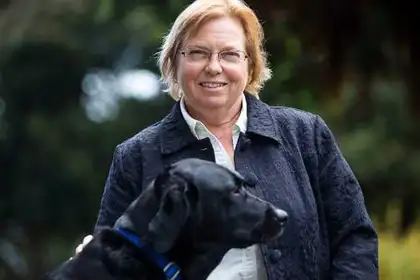
Dr Gretchen Good and her family's assistance dog, Caz.
The personal experience of parenting disabled children during lockdown has prompted a Massey University academic to speak out about the need for additional learning support for families.
Dr Gretchen Good, a senior lecturer in Rehabilitation and Disability Studies and Public Health, says the pandemic has highlighted the need for the Ministry of Education and disability support agencies to give extra support to children with disabilities and their families.
Dr Good has two school-aged children who both live with Down syndrome, vision and hearing impairments.
Life soon went from dropping children off every day to school – where they received individual learning support and speech therapies – to living under lockdown and trying to educate her children without the resources they required.
Dr Good and her husband also took the children to Riding for the Disabled, swimming with the Special Olympics team and other sports and activities. All of that came to an abrupt stop with the lockdown.
“We had to deal with what all parents had to deal with; loss of routine, having to teach at home, activities cancelled and relationships stressed – but we had additional concerns related to disabilities, like our children’s regression, which would be devastating. Our children thrive on routine and simply can’t cope with changes. Parents lost all the one-on- one support that the children get for all their therapies ranging from occupational, speech and vision therapy.”

Jane Lee
Being immune compromised, her children were sent home before schools officially went into lockdown on March 23, resulting in her family spending more time in lockdown.
Dr Good says she spent most evenings creating learning materials for her children. The materials the Ministry of Education had given to them and to other families was not available in a format that her children could access due to their vision impairment and it was not targeted at their learning level.
This was also not helped by the quick turnaround that forced people into lockdown, which meant Dr Good and her husband did not have time to get supplies for learning, arts and crafts, and suitable games. And there was no way to get learning material enlarged for their son, who has a significant vision impairment.
“It was impossible to work from home and look after children who need so much intense supervision and support for their education, and they can’t be set up on their own and left to do activities. What might work for other children didn’t work for ours – they couldn’t participate in Zoom or engage with the learning on TV as it was not appropriate for them and did not meet their needs.”
She says her children missed school and their friends and because they are non-verbal, they could not tell their parents their friends’ names or how to contact them, so they lost a lot of contact with their school community.
“Our children thrive on playgrounds and they didn’t understand why they couldn’t go to a park or touch things on out on walks. It was very challenging.”
But as the weeks rolled on, Dr Good and her husband got into a routine with their children and discovered strategies that worked. At 9.30am they began their school day learning with the materials she had created the night before.
At 2.00pm they would try and make arts and crafts followed by physical education outside at 3.00pm and then after dinner they would play board games, but with both parents trying to work from home during this schedule, Dr Good says it made things quite stressful.
They were lucky enough to get two online sessions with the speech therapist and she says this was successful as the therapist used interactive technology that her children were familiar with from before the lockdown.
But months after the initial lockdown Dr Good says, “it's not really over for families with children with special needs and high-risk health conditions.”
“Our children have been sent home from school any time there’s a sniffly nose and they have chronic drippy noses, so my husband and I ended up packing up and bringing our computers home from work again for three weeks because the children were sent home.”
Dr Good’s colleague, Jane Lee, a tutor in rehabilitation, is a single parent to seven children – four of whom who still live at home and one of whom is on the autism spectrum.
She also experienced first-hand the challenges of parenting a disabled child through a pandemic so together the two researchers decided to use their experiences to write a paper outlining the issues they encountered.
They are also in the process of writing a paper that focuses on solutions on how families can get through and what they advise services to do in the event of future lockdowns.
Ms Lee says she and her ex-husband decided to live together again over the lockdown to make co-parenting simpler for their family, but this only lasted for the first two weeks of lockdown. Ms Lee was concerned about how she was going to be able to juggle full-time work from home and parent her children, including her child on the autism spectrum.
She says her son was receiving reading support at school which ended when lockdown began, and regular schoolwork was sent home for the final few days of the school term. However, the need to prioritise paid employment competed with the need to supervise schoolwork for her son and two other school-aged children.
As the school holidays came to an end during lockdown she became mindful of not burning out as she was required to take on the role of teacher, mother and provider.
“Lockdown has reminded me of how uniquely my son with autism understands and perceives the world. The physical distancing rules are very strong in his mind, and he worries if someone comes closer than what he thinks is two metres. He understands that he isn’t allowed to touch things when we’re out walking, but if he touches something in a moment of inattention, he worries that he has caught the virus.
“I need people in my life to remember that my family may take a little longer to adjust to the new normal, post lockdown, but I want my family to be part of this rebuilding, of making a new normal where kindness is valued and where we look after everyone, including families with disabled children,” Ms Lee says.
The two researchers expressed how they would like professionals who contacted them throughout the lockdown to provide more than just a friendly check-in email and instead supply resources, ideas and learning materials.
Dr Good says “physio therapists, occupational therapists, speech and language therapists, orientation and mobility specialists, daily living skills instructors could also check in with families. I would have liked to have had some lesson plans or activities targeted for my children.”
She says teacher’s aides were not able to provide support to families to any great degree during the first lockdown and this is something that we could learn from as teacher aides in other countries that are having longer lockdowns are providing a presence online and helping to producing learning materials.
“They were feeling terribly helpless but maybe they have some ideas on what they can do to help us if it happens again. We don’t want to be a hidden minority in a lockdown again. Just like in any disaster, there is the risk that civil authorities react in earthquakes or disasters, or evacuations – disabled people and families of children with disabilities are excluded from disaster planning and response and this was the case in our lockdown too. We got excluded from the planning and response.”
Dr Good and Ms Lee recently presented the paper at an online international conference hosted by the Orientation and Mobility Association of Australasia.
They hope to present their next paper at a conference in February.